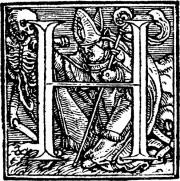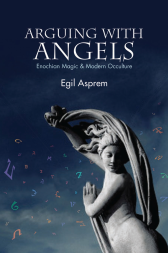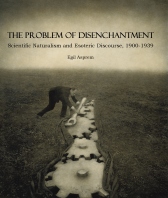We’ve grown accustomed to exciting titles that announce “the occult roots” of anything from Nazism to electronic music. While there’s certainly a lot of attention-grabbing hyperbole in such claims, it is true that much of the vaguely deviant, oppositional, and radical segments of Western culture has a touch of the occult – for reasons we are starting to understand quite well (tag: cultic milieu, occulture, rejected/stigmatized knowledge).
But what about the roots of modern occultism itself? In the (educated) popular imagination, occultism is generally considered an atavistic phenomenon, an anomalous and anachronistic flowering of irrationalism belonging to a bygone age. Some scholarship has continued in this vein, whether we think of the brand of intellectual historians that get embarrassed by its rational and scientific deficiency, or left-leaning, progressive academics who, like Adorno, see only a reactionary tendency that must eventually lead to a mysticized political irrationalism of the kind erupting in Germany in the 1930s.
Historians of occultism have, of course, long known that these views are highly inaccurate. They tell us more about the prevailing assumptions of “good science” and “good politics” today than about the historical realities that ushered in the movement we refer to as “occultism” in the nineteenth century. On the political side of things, some scholars suggest distinguishing between an “occultism of the left” and an “occultism of the right” to come to terms with the fact that there was a heavy and even decisive presence of occultists among socialists, feminists, anti-colonialists, anti-vivisectionists, and anarchists in the nineteenth century – in addition to those occultists who longed for a restoration of order, hierarchy, and Tradition.
If this already troubles the standard picture, things may in fact have been even more complicated – as Julian Strube demonstrates in his recent doctoral dissertation, due to be published by De Gruyter later this month (May 2016). Not only were there occult socialists, but modern occultism appears to have first emerged in early, pre-Marxist socialist circles. The pre-Marxist part is important here, for not only does occultism have socialist roots: Early socialism was itself aligned with thoroughly religious, even outright theocratic projects, often drawing on a form of heterodox, yet traditionalist, Catholicism. We have to face the socialist – and Catholic – roots of occultism.
The success of Marxism in the latter half of the nineteenth century, with its prominent atheist, secularist, and materialist tendencies, has obscured the fact that the beginnings of socialism in France in the wake of the revolution of the 1790s and during the Bourbon restoration period was heavily religious in nature. The three canonical “founders of socialism”, Henri Saint-Simon (1760-1825), Charles Fourier (1772-1837), and Robert Owen (1771-1858), all advocated forms of social utopianism where the separation of “religion” from “secular” society sometimes blurred, and where religious legitimations and organizational forms were sometimes blended with scientific and political ideas. The Fourierist phalanxes in the United States were, for example, not only laboratories of free love and cooperative economics, but also, as shown by Catherine Albanese, Dan McKanan and others, important conduits of Western esoteric ideas in the Americas. Owen, on his part was a more secular thinker, but famously became a spiritualist later in life.
More important in this context is the development of Saint-Simonism in France, where the movement of modern occultism also took shape around the middle of the nineteenth century. It was Saint-Simonism that inspired the coining of the term “socialism” in the first place, when Pierre Leroux used it to dismiss the movement in 1833. Saint-Simon’s work is characterized by an interest in synthesizing religion, science, and politics. Early on (1803) he suggested a “Cult of Newton” – very much in the same spirit of Auguste Comte’s later “Religion of Humanity”, the curiously religious overlay of French positivism – and toward the end of his life (1825) he published a book called Nouveau christianisme, which (much in the spirit with Enlightenment religious discourse) called for the rejuvenation of Christianity by ridding it of corrupt priestcraft and establishing a progressive, “positive” religion dedicated to the perfection and regeneration of humanity – here, on earth. Crucial to this task was the elevation of the poor. At the core of this thinking is a providentialism with clear roots in Christian thought, but, as has become so common in modern ideologies since, with the eschaton thoroughly immanentized. But this worldly utopianism was tempered not only by an intimate knowledge of the terrors of the previous revolution, but also by a deep fascination for the Catholic traditionalism of Joseph de Maistre (1753–1821). The socialist utopia and the romantic idea of the ancien régime are, in other words, emerging together.
As Strube writes, the Saint-Simonians developed all the antics of a sectarian new religious movement:
“The Saint-Simonians saw themselves as the heralds of a new Golden Age that would overcome the social fragmentation and realize a harmonious unity of religion, science, and philosophy. They declared themselves a “church,” the église saint-simonienne, choosing Saint-Amand Bazard (1791–1832) and Prosper Enfantin (1796-1864) as their pères suprêmes, or Supreme Fathers. As they announced in a series of immensely successful public lectures focusing on the religion saint-simonienne, they regarded themselves not as the theoreticians of a politico-economic doctrine, but as “apostles” preaching the revelations of their “prophet,” Saint-Simon. Those developments led to increasing tensions. The authoritative behavior of the Enfantin faction resulted in a schism at the end of 1831, leaving Enfantin as the single père and “Pope.” The movement fragmented further after the Saint-Simonian commune in Ménilmontant, where the “brothers” used to live as “monks” wearing spectacularly eccentric garments, was shut down by the authorities in 1832. Nevertheless, its doctrine exerted a lasting influence.” (Strube 2016, p. 7-8).
Key ideas in its doctrine were that of a “universal science” and divine law, the establishment of a harmonious synthesis of human and divine knowledge, and a total regeneration of the social world amounting to the establishment of a heavenly kingdom on earth. Perhaps the most important channel through which they would exert influence was modern occultism. The link here is the eccentric deacon Alphonse-Louis Constant, a radical French socialist and Catholic who was in and out of prison for his activism in connection with the failed revolutions of 1848.
Today, however, Constant is better known by the pen-name Eliphas Lévi, which he took in the 1850s, and under which he wrote some of the most influential works of modern occultism to this day, notably the Dogme et rituel de la haute magie, the Histoire de la magie, and La clef des grands mystères. These works would go on to have a profound influence on movements such as the Theosophical Society, which, in turn, created an exceptionally influential global network that developed and disseminated ideas about occult abilities, secret histories, political reform, and spiritual transformation across the modernizing world.

Alphonse-Louis Constant, the Catholic traditionalist and radical socialist – a.k.a. Eliphas Lévi, the founder of modern occultism.
The notion of a universal science, of harmony between science, religion, and politics, and about the necessity for reform of worldly institutions and the installment of inspired rule by timeless, divine principles, are all found in Lévi’s work, and have trickled through to various areas of modern culture via the occultisms that he inspired. While the origin of so many central tropes and motifs in Constant’s later work is old news, Strube now demonstrates that he did not so much develop these by taking a sudden interest in old esoterica, dressed up with some sciency and progressive ideas. Instead, he took most of it wholesale from the socialist circles in which he had been engaged all along, with a dash of de Maistreian traditionalism linking the “perennial wisdom” to post-revolutionary concerns:
“Constant clearly developed his theory of magic in the particular historical context of the 1850s. His reception of early-modern or medieval sources was remarkably superficial and selective. For this reason, it can hardly be said that early-modern or medieval sources formed the “frame of reference” for his magical theory. It was exactly the other way around, if he showed any actual knowledge of such writings.” (p. 18).
While we already knew that occultism offers a particularly fascinating window on the surprising twists and turns of science, religion, and politics in the modern era, Strube shows us just how deep this entanglement goes. Strube’s work will certainly change the way I teach the history of occultism.
References:
- Strube, Julian. 2015. Sozialismus, Katholizismus und Okkultismus im Frankreich des 19. Jahrhunderts. Die Genealogie der Schriften von Eliphas Lévi. PhD dissertation, University of Heidelberg, Germany.
- Strube, Julian. 2016. “Socialist religion and the emergence of occultism: a genealogical approach to socialism and secularization in 19th-century France.” Religion. DOI: 10.1080/0048721X.2016.1146926.
Note: Strube’s dissertation is scheduled to be published with De Gruyter later this month (May 2016).
Image credit: The demonically photoshopped Marx is courtesy of Ross Wolfe, who runs the wonderful Charnel-House blog. Check it out for your daily dose of Soviet architecture and socialist curiosa – like this post on Lenin’s brain.
 This blog post by Egil Asprem was first published on Heterodoxology. It is licensed under a Creative Commons Attribution-ShareAlike 3.0 Unported License.
This blog post by Egil Asprem was first published on Heterodoxology. It is licensed under a Creative Commons Attribution-ShareAlike 3.0 Unported License.









Another book that I should read when it comes out. Thanks, Egil.